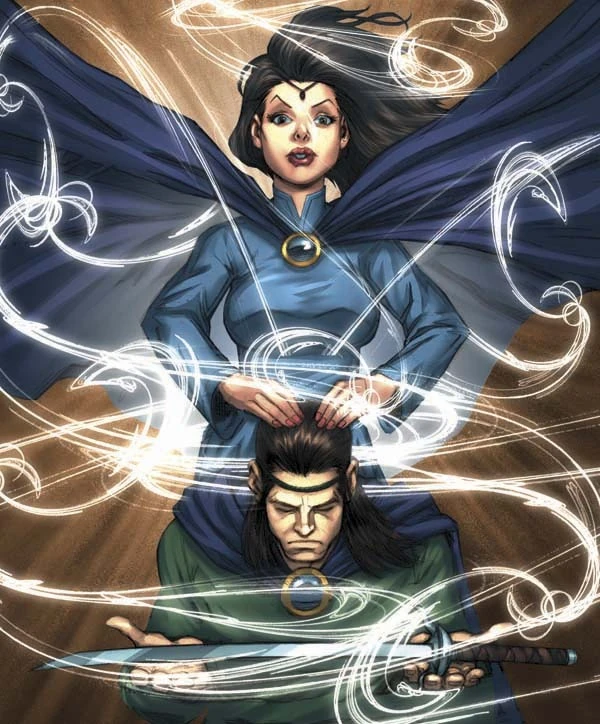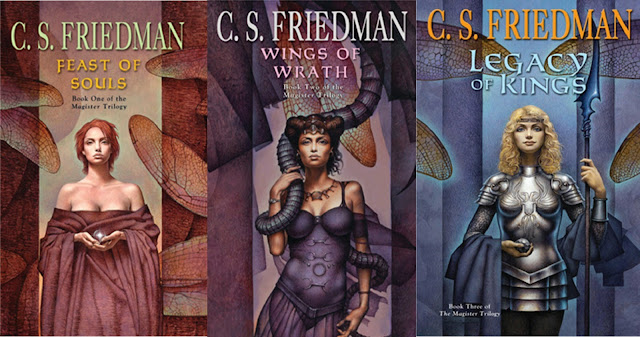10 Unique Magic Systems
By: Jesse C Cohoon
By: Jesse C Cohoon
1. Racial magic: each race has its own magic systems. For instance:
- Elves are well known for their magical mastery over natural areas
- Dwarves are known for working with stone, weapons and armor
- Gnomes are known for illusionists
2. “Land Magic” is what the card game – Magic: the Gathering is all about –Here are a couple of links how it works in the actual game, and the ideas behind them:
Keep in mind that you don’t have to use cards to use the concepts behind the colors.
Instead of using the colors/ types of land, you could even use different biomes to summon creatures/ various powers from. Here’s a good list to start with.
• Freshwater
• Freshwater wetlands
• Marine
• Coral reef
• Esturaries
TERRESTRIAL BIOMES:
• Tundra
• Rainforest
• Savanna
• Taiga
• Temperate forest
• Temperate grassland
• Alpine
• Chaparral
• Desert
• Badlands
More on biomes here
3. Family Magic: magic that is passed down through the generations from parents to their children. Many times this magic may be cast either differently or more powerful in some ways than “standard.” For instance, instead of learning “fireball,” someone may learn “waterball” or “airball” at the same level, or perhaps the spell they cast is able to be cast either easier or with a bonus to hit, damage, range or some other relevant feature.
A similar idea is “bloodline magic” which says if you have some unusual lineage in your background such as dragon, vampire, werewolf, etc. – it increases your spellcasting ability, potentially giving you some of the base powers of the lineage as you explore it further.
4. Card based magic: This type of magic is shown in the Yu-Gi-Oh card, Magic the Gathering, and many other games. In these types of games the magic itself is in the card itself and must be played (sometimes with the use of other cards to be able to summon their effects, such as lands in Magic the Gathering or a less powerful one to summon a more powerful one in Yu-Gi-Oh).

 One time I played with a “deck of the planes” where different combination of different plane powered cards, and the DM adjudicated whether or not I was able to do what I said I wanted to do – and how much power it took to do so.
One time I played with a “deck of the planes” where different combination of different plane powered cards, and the DM adjudicated whether or not I was able to do what I said I wanted to do – and how much power it took to do so. 5. Pattern magic as shown in David Drake’s Lord of the Isles series with Ilna being a master weaver whose patterns changed the world around her. She learned these patterns while being trapped in hell. The only materials needed for this type of magic? A skein of yarn.
6. Magic bonding, as shown in Mercedes Lackey’s Valdemar universe where people gain powers by bonding to magical, sentient horses. Similar bonding with other people can be seen in Robert Jordan’s Wheel of Time series, with the Aes Sedai and their Warders, as well as the Dragon Riders of Pern. The bonds go both ways, so what one is feeling the other feels as well. If done with monsters, you can have a Pokémon/ Digimon feel to it.
One way that bonding magic could work is that only one of the pair is magical and the other is the “power source” which allows them to cast. Another way is to have each of them have a certain percentage of the power but need the other to “complete the circuit” in order to be able to cast.
 7. Rhythmic magic which uses music, poetry, inspirational speeches, clever wit as magic, as in L.E. Modesitt, Jr, series Soprano Sorceress; Christopher Stasheff’s A Wizard in Rhyme; and Alan Dean Foster’s Spellsinger series. It also seems to be played with in some games’ version of the bard class (though never as powerful as it should be imho). One DM I had allowed me to play it as I wanted to be, in that I was able to try to cast anything I could think of I could do realistically with music. Whether it worked (or the dice were against me) was another story altogether.
7. Rhythmic magic which uses music, poetry, inspirational speeches, clever wit as magic, as in L.E. Modesitt, Jr, series Soprano Sorceress; Christopher Stasheff’s A Wizard in Rhyme; and Alan Dean Foster’s Spellsinger series. It also seems to be played with in some games’ version of the bard class (though never as powerful as it should be imho). One DM I had allowed me to play it as I wanted to be, in that I was able to try to cast anything I could think of I could do realistically with music. Whether it worked (or the dice were against me) was another story altogether. 8. Alchemical magic effects which can cause quasi-magical effects from potions, salves, powders/ dusts, and more. These concoctions are often made with strange, rare, and oftentimes dangerous-to-get ingredients. Some of these ingredients may not even be needed (or in fact may be deadly) in the final combination that the alchemist prepares. Most of the time the long-term use of such mixtures is unknown and unstudied.
9. Magic by physical perfection, stance, etc. as monks, or the classes presented in the “Tome of Battle, book of 9 swords.” Cashel in David Drake’s Lord of the Isles and Rock Lee in Naruto are such people. Those aiming for physical perfection can push themselves to incredible lengths, sometimes being able to compete with masters of magical arts who use other means of magic. But these marks of perfection aren’t without their price: they may push themselves too far and either severely injure themselves or die in the process.
10. Life as magic: in this system magic itself is vampiric in nature. This can be represented in one of several ways.

One way is that the magic user ages unnaturally and must rest to store magic up for the next magic battle that they are to be a part of. This is how the Dennis L. McKiernan uses Mages in his books.
Another way is that it could zap the life of the planet itself, draining the plant and animal life as in the world of Athas. People who do this deliberately are called Defilers. In the Dark Sun setting defiling is a good way of making a lot of enemies, as well as losing allies - but sometimes the choice comes down to "Do I save myself (and everyone else) now, or do I let everything I've worked so hard up to this point fall to pieces by letting myself get killed?"
A third way that life can be used to fuel magic is that there could be a mystical connection to another. This connection could be on purpose so that the magic user doesn’t drain his or her own life force. The moral problem with doing such a thing is that the magic user would essentially be slowly killing them. The magic might link people who don’t know each other, as in C.S Friedman’s Magister Trilogy – the symptoms of being drained are a soul draining exhaustion that drains the will to live but has no other treatable symptoms.
A final way that this could be done is through the abhorrent practice of sacrificial magic, whereby someone or something is killed in order to give the magic user power to cast his or her spells.
If you like this blog post please comment, +1, or feel free to donate money to my Patreon page!



You got me to thinking. Now, in Mythus there are no guidelines for how the different schools do their casting, but it makes sense that a Fortune Teller (frex) would use his yarrow sticks and cards when performing his magick. Just as a Spell Singer uses song. I guess that Gary Gygax didn't bother about such things believing that others would.
ReplyDeleteShould each of these variant magic systems have a different mechanical *feel* to them? Or the mechanics are besides the point?
Delete